The COVID-19 pandemic has been disastrous for businesses and societies around the world. But the startup spirit will triumph, and a range of entrepreneurship support organisations has risen to the challenge.

This includes TiE Mumbai, the local hub of the global network called The Indus Entrepreneurs, founded in Silicon Valley in 1992. See also our earlier profiles of resilience activities by TiE Bangalore, TiE Global, TiE Silicon Valley, TiE Pune, TiE Kerala, TiE Hyderabad, and TiE Kolkata.
Support for entrepreneurs
The unprecedented national lockdown came as a shock to many firms. “Many founders did not want to speak up at first in public forums, but my conversations with them revealed a number of emotions which reflected the problems they were facing,” explains Naveen Raju, Executive Director of TiE Mumbai, in a chat with YourStory.
Mapping out these pain points led to several planned events and sessions over the course of four months (see the table below). From March 18 to July 30, TiE Mumbai held around 150 webinars.
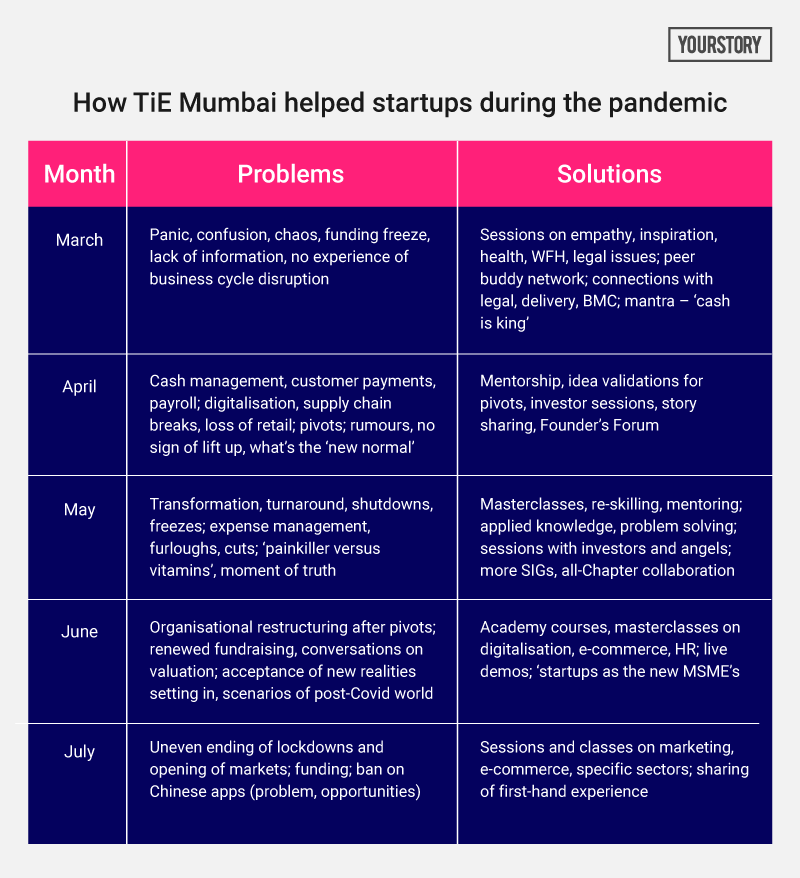
The online sessions included masterclasses, panels, investor sessions, mentoring, clinics, and workshops. They ranged from Ask Me Anything sessions to Demo Days, along with a Founder’s Forum and TiE Academy. Topics spanned across technology, business, legal, HR, financial, and fundraising themes.
Over 400 hours of digital content were created, 25,000 participants attended, and 280 speakers were featured, Naveen says with pride.
Online audiences came from 70 cities across India and overseas. A hundred startups participated in 13 Demo Days as well. TiE Mumbai’s partners include 100watts, 100x.VC, Dell, Peachtree, and MyCFO.
The events were promoted widely across social media as well. For example, from March 25 to July 11, TiE Mumbai reported over 274,000 impressions via Twitter.
Challenges and opportunities
Despite the challenges faced during the pandemic, some sectors have benefited, Naveen explains. This includes companies in sectors like collaborative communications software, healthtech, edtech, media, entertainment, and gaming.
Retail stores complied with government regulations to first sell only essentials, and furniture providers changed focus to meet the demands of WFH (work from home). Some startups were also advised to take up SME licenses to avail of government schemes.
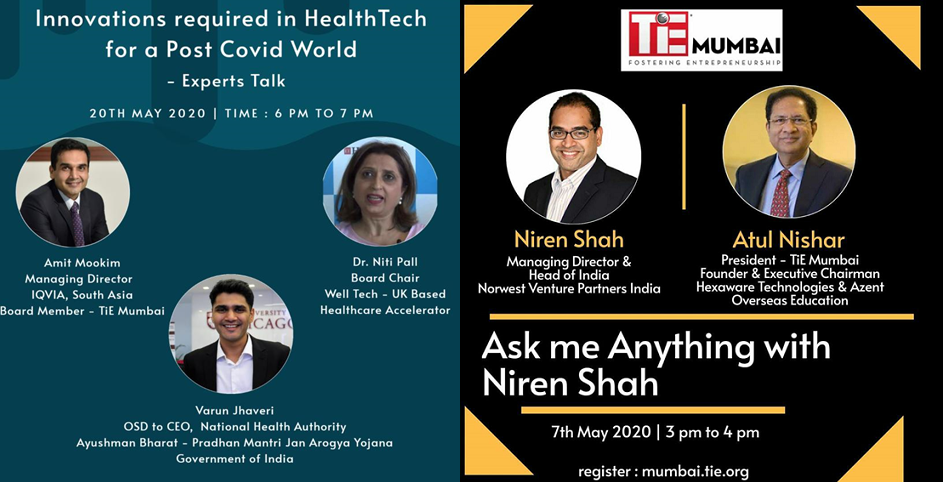
Organisational capacity
The TiE Mumbai chapter has eight full-time staff. “The COVID-19 period has been difficult as workloads quadrupled, and extended family members of staff members are in the risk zone,” Naveen explains.
Some colleagues moved to locations far from central Mumbai to be safe. “But there, they were challenged by issues like electrical outages and spotty internet connectivity. Still, they managed to hustle for the webinars and make them successful,” Naveen proudly says.
Role of government
Central government agencies like NITI Aayog conducted all-India level demo days for healthtech startups, who pivoted to offer products and solutions to combat COVID-19. “These demo days helped get the attention of investors and enterprise partners to help these startups scale up,” Naveen says.
“The Maharashtra government used the help of food and beverage startups to prepare food and distribute it to migrant workers and poor people. This was handled through the network effect of the TiE Food Network,” Naveen explains.
It also conducted the Maharashtra Startup Week. Top selected startups could get work from various government departments worth Rs 15 lakh per order.
“The Maharashtra Innovation Society, which works with startups in the state, will handhold these startups in navigating through the job orders to ensure smooth liaison between the departments and the startups,” Naveen adds. TiE Mumbai directly supported the government in these initiatives.
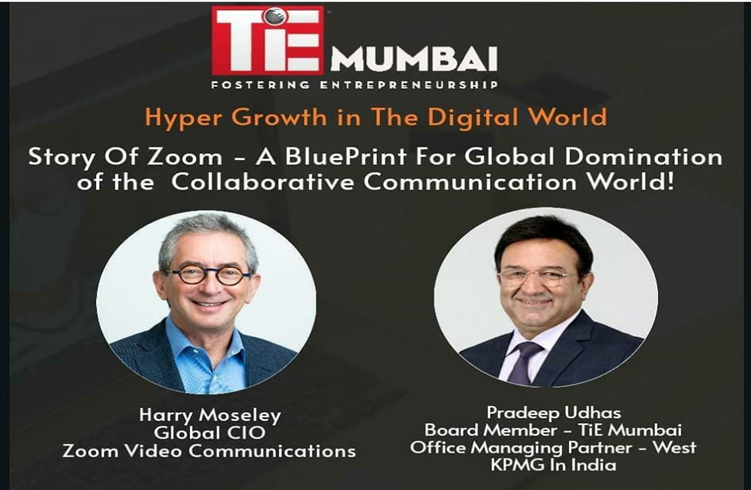
Startup impacts
TiE Mumbai also helped share resilience stories of startups in its membership base. “Once the pandemic hit, the event industry went into a complete lockdown – and so did our major revenue source,” says Sanket Shrikanth, Founding Partner at Urban Spice. The company provides frozen food solutions to the QSR industry, via food pop-ups at B2B and B2C events.
“We have done more than 2,000 event days across 14 cities in India over three years. We had been planning to enter the B2B2C space through a hybrid FMCG model even before the pandemic hit. So the pandemic made it a compulsion to do so,” he adds.
TIE Mumbai gave Sanket the opportunity to build the SIG (Special Interest Group) called TiE Food Network (TFN). “I hosted sessions on the TiE Mumbai platform which spoke about practical lessons and solutions for foodpreneurs,” he explains.
Featured speakers included Jaydeep Barman (Rebel Foods), Sagar Daryani (Wow Momos), Jaspal Sabharwal (Tagtaste), Raghav Verma (Chaayos), and Chef Harpal Sokhi. “Over the last ten weeks, we managed to curate organic data of over 28,000 foodpreneurs through these sessions,” Sanket says.
A ‘farm to fork’ community was built with offline collaboration and even joint business deals. “This phygitech kitchen infrastructure model can help aspiring cloud kitchen brands scale up,” he adds. TiE Mumbai helped connect to tech enablers, influencers, and mentors in this regard.
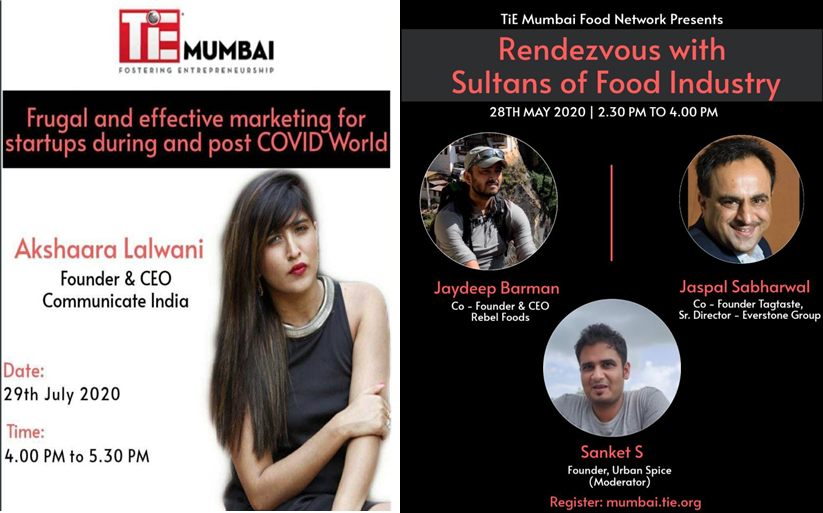
“While we were able to quickly catch up and deliver on promises for ongoing implementations through WFH, we faced challenges in deal closures and cash flow,” explains Sunil Gupta, Founder and CEO of InnoVaL Digital Solutions.
Lack of customer meetings impacted enterprise B2B sales as well. “Some customers deferred their decision to buy. We also had to deal with re-negotiation of existing and running contracts,” he adds.
As its member for many years, he commends TiE for its vibrant and passionate ecosystem of entrepreneurs and mentors, who are willing to help startups and early-stage companies. “I am also a charter member of TiE, and have helped many companies,” Sunil adds.
“TiE helped us in connecting to an advisory firm, myCFO. They are helping us in putting in place the financial model for overall business improvement for sales, delivery, and financials,” he explains.
“When schools began shutting before the March lockdown, there was chaos and concern about the future in the minds of students, parents, teachers, and the community in general,” recalls Aubrey Aloysius, Co-founder and Managing Director of Lorraine Music Academy.
The music school needed to immediately convert all operations into e-learning mode using appropriate tech platforms. “TiE Mumbai has been engaging with us through several excellent programmes, drawing wisdom from leaders across a wide spectrum of industries,” explains Aubrey.
“The immense knowledge pool available through these interactions helped our learning process in adapting to the changing environment over the past months,” he adds. He has been a member of Tie Mumbai since around 2000 and has met TiE founders like Kanwal Rekhi.
“I was in the process of pivoting my business, so in a way, this pandemic did more good to me than harm,” says Sandeep Gandotra, Managing Director of retail and logistics startup Lapalap.
Farming and food supply chains were disrupted, and there was fear and anxiety in the market. Learnings from a TiE Mumbai session by Raj Jaswa helped Sandeep revamp his business model.
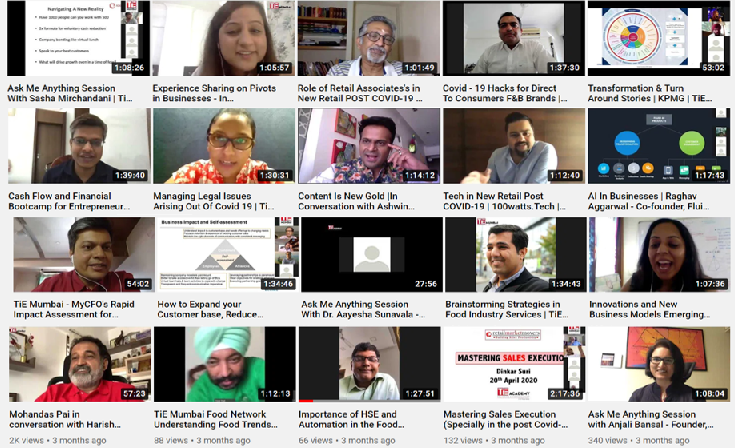
TiE Mumbai online sessions (1)
Tips and advice
The TiE Mumbai team and startup members offer a range of business tips for entrepreneurs, from cashflow to pivots. “Prioritise expenses and only spend on absolutely necessary items. Take a re-look at your marketing budgets, re-negotiate rentals,” Naveen advises.
“Introduce multiple pricing models, as well as paying mechanisms for your customers. Rationalise salaries and cut them only once – stretch what cash reserves you have to last for 15-18 months,” he adds.
Fundraising need not be accompanied by worries about valuation. “If your business delivers great value, then you will catch up with your intended valuation in the future,” Naveen suggests.
While some traditional businesses have had to pivot completely, for the time being, digital businesses have been fortunate to need only minor pivots. “For example, we know of artisan craft beer startups completely changing their production lines to make sanitisers, textile companies starting to make fancy face masks, and 3D printing startups making face shields and other PPE devices,” Naveen observes.
On the other hand, tech startups in AI and ML easily pivoted to contact tracing. “They added a layer of predictive analytics for tracking the spread of the pandemic,” he says.
“Conserve cash, have good control over cash flow. Work out well the unit economics of your offering. Pivot your business model early if you don’t see signs of success; fail fast and de-risk by having additional revenue lines,” adds Sunil Gupta of InnoVaL.
“Think mission backward, not resource forward. As an entrepreneur, you are in the business of taking decisions – take them super quick, be brutal in taking them, and don't forget to own the consequences,” advises Sanket Shrikanth of Urban Spice.
He also cites a quote by F1 racing driver Ayrton Senna: “You can't overtake 15 cars in sunny weather, but you can when it’s raining.”
“Have a hunger to learn, think differently, be keen to adapt, and have a determination to survive beyond this crisis,” advises Aubrey Aloysius of Lorraine Music Academy.
It is important to have a long-term mindset while planning for the post-COVID era. “Keep fine-tuning, refining, or re-creating your offering. This tenacious mindset will see many emerge out of the crisis as great leaders of great companies,” he suggests.
An entrepreneur has to persevere in the face of criticism. “Fortunately, there are some who will support you and guide you. So, never stop asking for help whenever the need arises. Find a mentor or coach,” Sandeep Gandotra advises.
“Read 2020 as Two Zero Two Zero – in other words, ‘0000.’ This is the new base year for everyone,” he jokes. It is important to be frugal, adaptable, and collaborative. “What I have realised is that herd mentality will not work anymore. People who are creative and have a disruptive strategy stand to gain far more,” he adds.
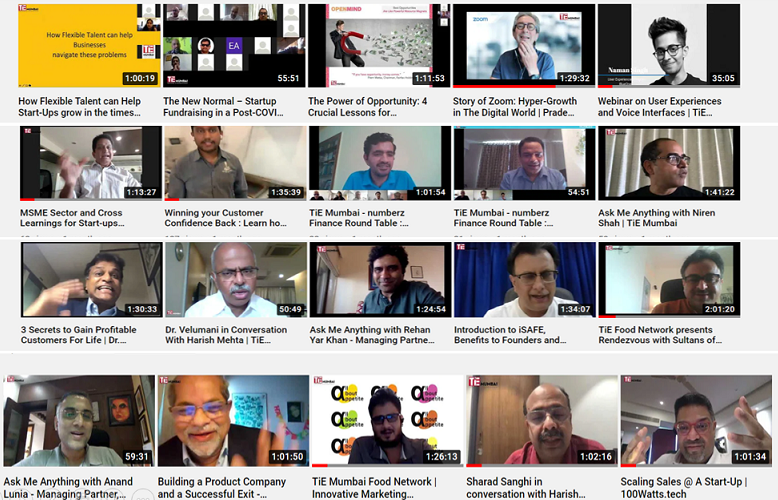
TiE Mumbai online sessions (2)
The road ahead
TiE Mumbai has a packed schedule in the coming months as well. Larger events include the TiE Food Network Bazaar, Investor Summit, and TiEcon Mumbai.
A four-month course on Introduction to Entrepreneurship will be offered by IIT professors. There will be courses on Design Thinking and Business Model Creation (Kaustubh Dhargalkar), Digital Business (Sanjay Mehta), and Internet Basics (Tejas Jhaveri).
Startup founders also provide suggestions for TiE Mumbai’s journey ahead. Sanket Shrikanth of Urban Spice calls for more peer brainstorming camps, special interest accelerators, and cross-collaborations.
“TiE can help more early-stage companies in getting funded. They can open up more networks for various business development support,” Sunil of InnoVaL suggests.
“This is an excellent time for TiE Mumbai to draw in experts as panelists, speakers, and mentors from not just Mumbai, but across India and other parts of the world,” observes Aubrey Aloysius of Lorraine Music Academy.
“This pandemic is a great disruptor. It will enable TiE Mumbai to reach out and bring the world to startups in India. The world is now an oyster as we work from home,” he adds.
Mental health
In the long run, mental fitness is a key priority for startups during these tough times. “If you think your startup will not survive, shut shop and restart after 15-18 months when market conditions become favourable,” Naveen advises.
There may be no point in stressing and bleeding the startup now. “Hunkering down will help you manage your mental fitness and make you stronger for the future,” he adds. In other cases, pivots or staying the course will help.
There is also an information overload in the news and social media. “Don’t see too much news and WhatsApp messages, shield yourself from gossip. Develop your own circle of scientific trusted sources and stick to them,” Naveen urges.
Finally, hobbies and side-projects play an important role as well. “Don’t forget your hobbies and passion – keep at it, exercise, and become a source of fun for your people,” he jokes.
“Remember, this is a phase affecting everyone, and hence is a level playing field for all. If things go wrong, it is not necessarily your mistake,” Naveen signs off.
(Edited by Suman Singh )
Want to make your startup journey smooth? YS Education brings a comprehensive Funding Course, where you also get a chance to pitch your business plan to top investors. Click here to know more.
Link : https://yourstory.com/2020/08/tie-mumbai-entrepreneurs-resilience-coronavirus
Author :- Madanmohan Rao ( )
August 14, 2020 at 11:08AM
YourStory



